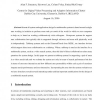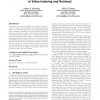109
click to vote
ICMCS
2009
IEEE
14 years 12 months ago
2009
IEEE
This paper seeks to unravel whether commonly available social tagged images can be exploited as a training resource for concept-based video search. Since social tags are known to ...
110
click to vote
MMS
2007
15 years 1 months ago
2007
Almost all system and application design for multimedia systems is based around a single user working in isolation to perform some task yet much of the work for which we use comput...
115
click to vote
MM
2004
ACM
15 years 7 months ago
2004
ACM
Three video search systems were compared in the interactive search task at the TRECVID 2003 workshop: a text-only system, which searched video shots through transcripts; a feature...
135
click to vote
MM
2006
ACM
15 years 8 months ago
2006
ACM
Precise automated video search is gaining in importance as the amount of multimedia information is increasing at exponential rates. One of the drawbacks that make video retrieval ...
118
click to vote
MM
2006
ACM
15 years 8 months ago
2006
ACM
Most existing web video search engines index videos by file names, URLs, and surrounding texts. These types of video roughly describe the whole video in an abstract level without ...
134
Voted
ICMCS
2006
IEEE
15 years 8 months ago
2006
IEEE
We present VideoPot, a desktop video search system designed for digital video files stored on personal computers. The core metric of this system is based on video-indexing techno...
129
click to vote
CIVR
2007
Springer
15 years 8 months ago
2007
Springer
Though both quantity and quality of semantic concept detection in video are continuously improving, it still remains unclear how to exploit these detected concepts as semantic ind...
125
Voted
CIVR
2007
Springer
15 years 8 months ago
2007
Springer
We propose to incorporate hundreds of pre-trained concept detectors to provide contextual information for improving the performance of multimodal video search. The approach takes ...
147
click to vote
CIVR
2007
Springer
15 years 8 months ago
2007
Springer
Near-duplicate keyframes (NDK) play a unique role in large-scale video search, news topic detection and tracking. In this paper, we propose a novel NDK retrieval approach by explo...
108
click to vote
ICMCS
2007
IEEE
15 years 8 months ago
2007
IEEE
Until now, systematic studies on the effectiveness of concept detectors for video search have been carried out using less than 20 detectors, or in combination with other retrieval...





